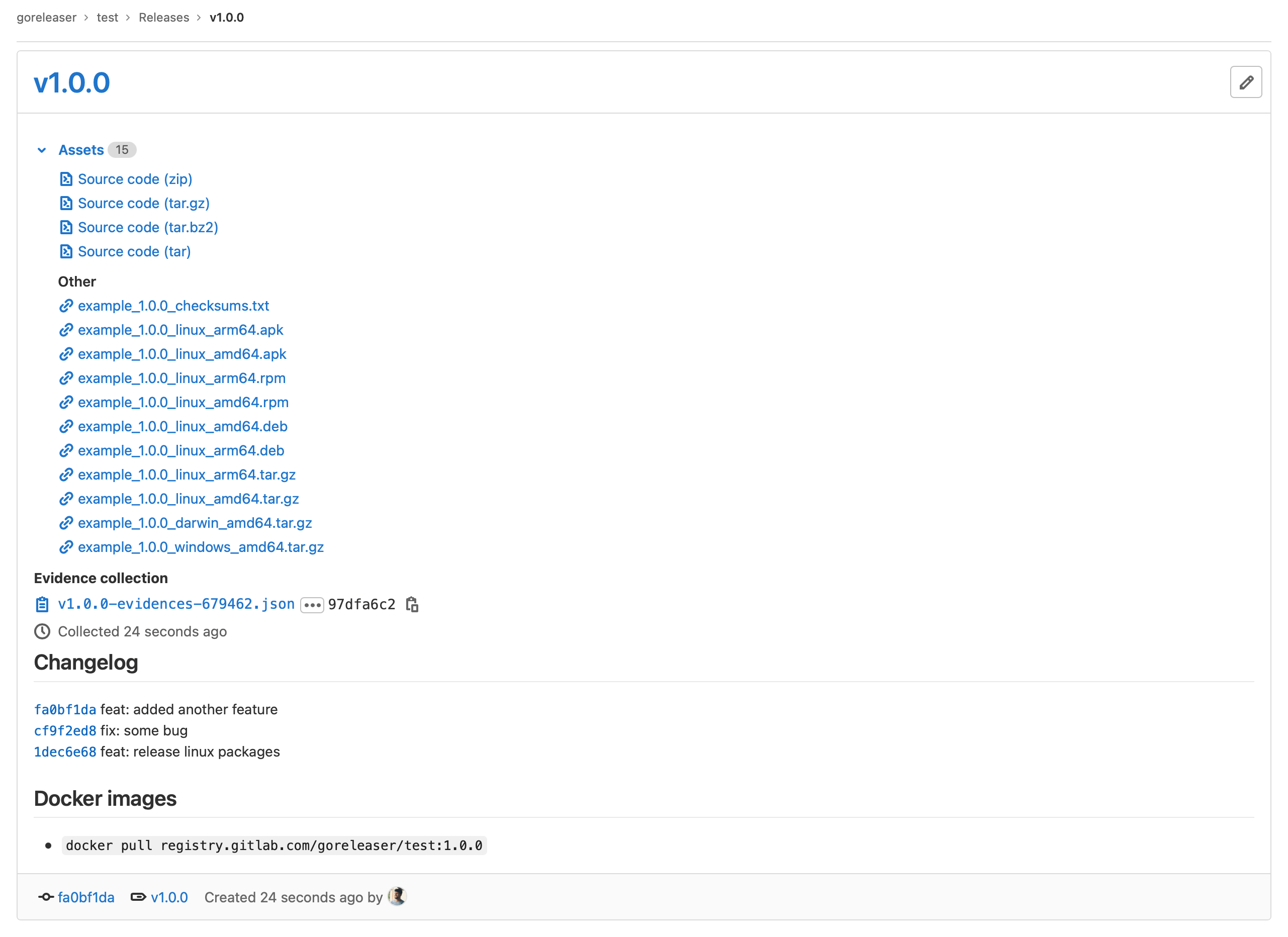GitLab CI¶
Below are some example GitLab CI jobs that use GoReleaser to release a project.
If you are using private hosted or Enterprise version of GitLab, please follow this guide before diving into the details.
Basic Releasing¶
You can easily run GoReleaser in GitLab CI using its Docker container.
In the repository's GitLab CI settings, add a GITLAB_TOKEN variable. The value should be an API token with api scope for a user that has access to the project. This variable should be masked and optionally protected if the job will only run on protected branches and tags.
Warning
If you use a project access token, make sure to set use_package_registry to true as well, otherwise it might not work.
Warning
If you are using a protected variable to store any of the values needed by goreleaser, ensure that you are protecting the tags as CI jobs in Gitlab only may access protected variables if the job is run for protected refs (branches, tags).
See Quick Start for more information on GoReleaser's environment variables.
Add a .gitlab-ci.yml file to the root of the project:
stages:
- release
release:
stage: release
image:
name: goreleaser/goreleaser
entrypoint: [""]
rules:
- if: $CI_COMMIT_TAG
variables:
# Disable shallow cloning so that goreleaser can diff between tags to
# generate a changelog.
GIT_DEPTH: 0
script:
- goreleaser release --clean
Notice that entrypoint is intentionally blank. See the GitLab documentation on entrypoints for more information.
When tags are pushed to the repository, an available GitLab Runner with the Docker executor will pick up the release job. goreleaser/goreleaser will start in a container, and the repository will be mounted inside. Finally, the script section will run within the container starting in your project's directory.
Releasing Archives and Pushing Images¶
Pushing images to a registry requires using Docker-in-Docker. To create GitLab releases and push images to a Docker registry, add a file .gitlab-ci.yml to the root of the project:
stages:
- release
release:
stage: release
image: docker:stable
services:
- docker:dind
variables:
# Optionally use GitLab's built-in image registry.
# DOCKER_REGISTRY: $CI_REGISTRY
# DOCKER_USERNAME: $CI_REGISTRY_USER
# DOCKER_PASSWORD: $CI_REGISTRY_PASSWORD
# Or, use any registry, including the official one.
DOCKER_REGISTRY: https://index.docker.io/v1/
# Disable shallow cloning so that goreleaser can diff between tags to
# generate a changelog.
GIT_DEPTH: 0
# Only run this release job for tags, not every commit (for example).
rules:
- if: $CI_COMMIT_TAG
script: |
# GITLAB_TOKEN is needed to create GitLab releases.
# CI_JOB_TOKEN is needed if use_job_token is set.
# DOCKER_* are needed to push Docker images.
docker run --rm --privileged \
-v $PWD:/go/src/gitlab.com/YourGitLabUser/YourGitLabRepo \
-w /go/src/gitlab.com/YourGitLabUser/YourGitLabRepo \
-v /var/run/docker.sock:/var/run/docker.sock \
-e DOCKER_USERNAME \
-e DOCKER_PASSWORD \
-e DOCKER_REGISTRY \
-e GITLAB_TOKEN \
-e CI_JOB_TOKEN \
goreleaser/goreleaser release --clean
In GitLab CI settings, add variables for DOCKER_REGISTRY, DOCKER_USERNAME, and DOCKER_PASSWORD if you aren't using the GitLab image registry. If you are using the GitLab image registry, you don't need to set these.
Add a variable GITLAB_TOKEN if you are using GitLab releases. The value should be an API token with api scope for a user that has access to the project.
Alternatively, you can provide the gitlab token in a file. GoReleaser will check ~/.config/goreleaser/gitlab_token by default, but you can change that in the .goreleaser.yaml file:
env_files:
gitlab_token: ~/.path/to/my/gitlab_token
Note that the environment variable will be used if available, regardless of the gitlab_token file.
The secret variables, DOCKER_PASSWORD and GITLAB_TOKEN, should be masked. Optionally, you might want to protect them if the job that uses them will only be run on protected branches or tags.
Make sure the image_templates in the file .goreleaser.yaml reflect that custom registry!
Example:
dockers:
- goos: linux
goarch: amd64
image_templates:
- "registry.gitlab.com/Group/Project:{{ .Tag }}"
- "registry.gitlab.com/Group/Project:latest"
Example Repository¶
You can check this example repository for a real world example.
